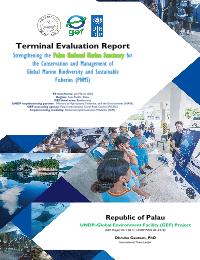
Palau National Marine Sanctuary (PNMS) Terminal Evaluation
Output 1.4 Equitable, resilient and sustainable systems for health and pandemic preparedness strengthened to address communicable and non-communicable diseases, including COVID-19, HIV, tuberculosis, malaria and mental health
Output 2.3 Responsive governance systems and local governance strengthened for socio economic opportunity, inclusive basic service delivery, community security, and peacebuilding
Output 3.1 Institutional systems to manage multi-dimensional risks and shocks strengthened at regional, national and sub-national levels
Output 3.2 Capacities for conflict prevention and peacebuilding strengthened at regional, national and sub-national levels and across borders
Output 3.3 Risk informed and gender-responsive recovery solutions, including stabilization efforts and mine action, implemented at regional, national and sub-national levels
Goal 14. Conserve and sustainably use the oceans, seas and marine resources for sustainable development
14.1 By 2025, prevent and significantly reduce marine pollution of all kinds, in particular from land-based activities, including marine debris and nutrient pollution
14.2 By 2020, sustainably manage and protect marine and coastal ecosystems to avoid significant adverse impacts, including by strengthening their resilience, and take action for their restoration in order to achieve healthy and productive oceans
14.3 Minimize and address the impacts of ocean acidification, including through enhanced scientific cooperation at all levels
14.4 By 2020, effectively regulate harvesting and end overfishing, illegal, unreported and unregulated fishing and destructive fishing practices and implement science-based management plans, in order to restore fish stocks in the shortest time feasible, at least to levels that can produce maximum sustainable yield as determined by their biological characteristics
14.5 By 2020, conserve at least 10 per cent of coastal and marine areas, consistent with national and international law and based on the best available scientific information
14.6 By 2020, prohibit certain forms of fisheries subsidies which contribute to overcapacity and overfishing, eliminate subsidies that contribute to illegal, unreported and unregulated fishing and refrain from introducing new such subsidies, recognizing that appropriate and effective special and differential treatment for developing and least developed countries should be an integral part of the World Trade Organization fisheries subsidies negotiation[c]
14.7 By 2030, increase the economic benefits to small island developing States and least developed countries from the sustainable use of marine resources, including through sustainable management of fisheries, aquaculture and tourism
14.a Increase scientific knowledge, develop research capacity and transfer marine technology, taking into account the Intergovernmental Oceanographic Commission Criteria and Guidelines on the Transfer of Marine Technology, in order to improve ocean health and to enhance the contribution of marine biodiversity to the development of developing countries, in particular small island developing States and least developed countries
14.b Provide access for small-scale artisanal fishers to marine resources and markets
14.c Enhance the conservation and sustainable use of oceans and their resources by implementing international law as reflected in the United Nations Convention on the Law of the Sea, which provides the legal framework for the conservation and sustainable use of oceans and their resources, as recalled in paragraph 158 of "The future we want"
1: Environment


